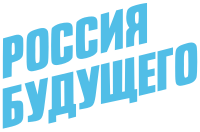Russia of the Future Россия Будущего | |
|---|---|
 | |
| Leader | Vacant |
| Founder | Alexei Navalny Leonid Volkov |
| Founded | 15 December 2012 (People's Alliance) 8 February 2014 (Progress Party) 22 February 2018 (Working Title) 19 May 2018 (Russia of the Future) |
| Dissolved | 29 April 2021 (de facto)[1] |
| Preceded by | NAROD Movement |
| Succeeded by | Navalny Headquarters (2022) |
| Headquarters | Ulitsa Leninskaya Sloboda, 19 115280 Moscow, Russia |
| Membership (2020) | 100,000[2] |
| Ideology | Reformism Anti-corruption Pro-Europeanism |
| Political position | Centre[3][4] |
| National affiliation | Opposition Coordination Council (2012–2013) Navalny Headquarters (2017–2021) |
| Website | |
| partyprogress | |
Russia of the Future (Russian: Росси́я Бу́дущего, romanized: Rossíya Búdushchego, IPA: [rɐˈsʲijə ˈbudʊɕːɪvə]), originally known as the People's Alliance (Наро́дный Алья́нс, Naródnyy Al'yáns) and formerly called the Progress Party (Па́ртия Прогрéсса, Pártiya Progréssa), is an unregistered opposition political party in Russia founded on 15 December 2012 by Leonid Volkov and later refounded on 19 May 2018 by Alexei Navalny, who was also the founder of the non-profit organisation Anti-Corruption Foundation.[5]
Russia of the Future opposes Russian President Vladimir Putin and the ruling party United Russia. The party's platform stood for the decentralization of power in Russia, cutting the number of government officials, lustration for those responsible for political repressions, the reduction of the president's powers, possibly switching to a parliamentary republic under the rule of law, and ensuring the independence of the judiciary. It also stipulated "drastically reducing" government interference in the economy, ending censorship, prohibiting the government from owning media outlets and abolishing conscription. The foreign policy plan called for introducing visas with Central Asia, stopping support for so-called rogue states and partnering up with Western countries.[6]
According to Navalny's ally Lyubov Sobol, the goals of the party include "real changes, real reforms", including increased property protections, a fair criminal-justice system and battling corruption, "so that money from the budget does not flow into offshores and is not spent on yachts and palaces". The founding session of the party was attended by 124 delegates from 60 of Russia's regions.[7] The party has a seven-member central committee instead of a chairman.[8]
Russia's Ministry of Justice has repeatedly declined registration of the party on the grounds that another party of the same name already existed or due to alleged paperwork errors.[9][10][11]
- ^ https://www.kommersant.ru/doc/4794032 Волков объявил о роспуске штабов Навального
- ^ Tonya Samsonova. Партия Прогресса (in Russian). Archived from the original on 19 January 2021. Retrieved 20 September 2020.
- ^ "Навальный: Демократическая оппозиция должна смещаться в левый центр" [Navalny: Democratic opposition must move to the center left]. Русский Монитор. 26 January 2019. Retrieved 22 June 2019.
- ^ Information Resources Management Association (2017). Media Influence: Breakthroughs in Research and Practice. IGI Global. p. 210. ISBN 9781522539308. Retrieved 15 December 2017.
- ^ "Kremlin Foe Navalny Launches New Political Party". Radio Free Europe/Radio Liberty. 19 May 2018. Retrieved 19 May 2018.
- ^ "Navalny's Party Holds Founding Congress for Third Time". 18 November 2013.
- ^ "Команда Навального учредила новую партию" [Navalny's team established a new party]. РБК. 19 May 2018. Retrieved 19 May 2018.
- ^ Ведомости (19 May 2018). "Партия Навального получила название "Россия будущего"" [Navalny's party was named "Russia of the Future"]. Retrieved 31 May 2018.
- ^ "Russian Supreme Court liquidates 'Russia of the Future' — the party that kept Navalny from registering his political party back in 2019". Meduza. 21 September 2020.
- ^ "Justice Ministry declines to register Navalny supporters' party Russia of the Future". Interfax. 7 June 2019.
- ^ "Russia's Justice Ministry again refuses to register Alexey Navalny's opposition political party". Meduza. 27 August 2018.